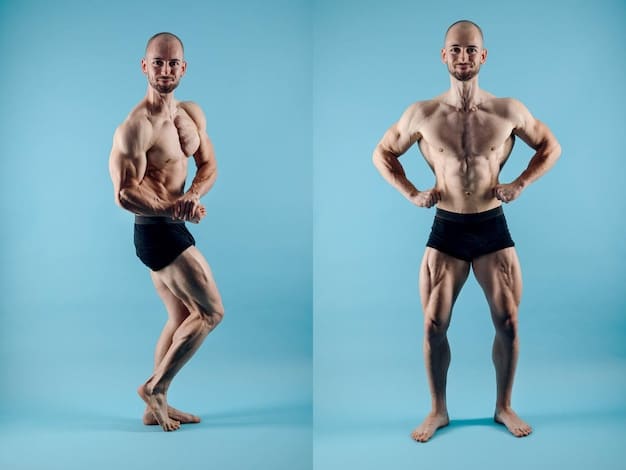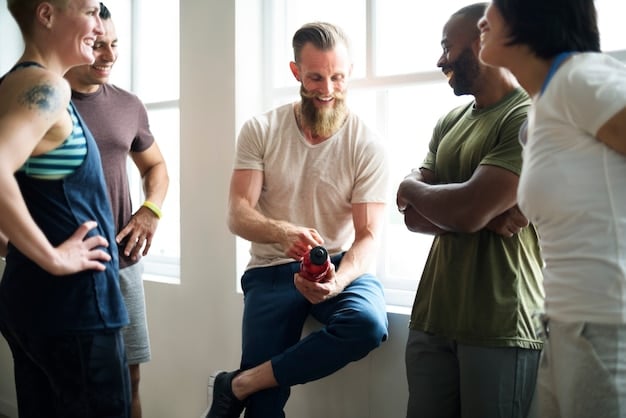Social Media’s Impact on Male Body Image: Healthy Mindset Strategies

Social media significantly influences male body image, often leading to unrealistic expectations and mental health challenges; adopting mindful strategies and promoting positive self-perception are crucial for fostering a healthier mindset.
The proliferation of social media has undeniably reshaped how we perceive ourselves, and its impact on male body image is a growing concern. This article explores the impact of social media on male body image: strategies for a healthier mindset, offering insights and practical guidance for navigating this complex landscape.
Understanding Social Media’s Influence on Men
Social media platforms are awash with idealized images of male bodies, contributing to a phenomenon where men increasingly compare themselves to unrealistic standards. Understanding the multifaceted ways in which social media shapes these perceptions is vital for developing effective coping strategies.
The Prevalence of Idealized Images
Social media algorithms often prioritize content that showcases aesthetically pleasing physiques, creating a skewed perception of reality. This constant exposure to “perfect” bodies can lead to feelings of inadequacy and body dissatisfaction among men.
The Role of Influencers and Celebrities
Influencers and celebrities often promote specific body types and lifestyles, further reinforcing these idealized standards. Their carefully curated images can present an unattainable reality, impacting men’s self-esteem and body image.
- Highlighting the pervasiveness of filters and editing tools.
- Discussing the financial incentives behind promoting certain body types.
- Examining the psychological impact of comparing oneself to influencers.
The subtle cues and overt messages conveyed through social media can significantly warp one’s perception of what is normal and achievable. It is crucial to critically analyze the content consumed and recognize the pressures it can impose.

In conclusion, understanding the pervasive influence of idealized images, celebrity endorsements, and algorithmic biases is the first step towards mitigating the negative impact of social media on male body image.
The Psychological Effects of Body Image Concerns
Body image concerns are not merely superficial; they can have profound psychological effects on men, including anxiety, depression, and a distorted self-perception. Recognizing these effects is crucial for promoting mental well-being.
Anxiety and Depression
The pressure to conform to idealized body standards can trigger anxiety and depression in men. Constant self-comparison and feelings of inadequacy can erode self-esteem and overall mental health.
Body Dysmorphic Disorder (BDD)
In severe cases, body image concerns can lead to Body Dysmorphic Disorder (BDD), a mental health condition characterized by obsessive focus on perceived flaws in one’s appearance. BDD can significantly impair daily functioning and quality of life.
- Discussing the diagnostic criteria for BDD.
- Highlighting the importance of early intervention and treatment.
- Examining the link between social media and BDD.
The psychological effects extend beyond clinical disorders. Many men experience a chronic sense of dissatisfaction with their bodies, leading to a negative self-image and decreased confidence.
Ultimately, understanding the far-reaching psychological consequences of body image concerns is essential for fostering a supportive environment and encouraging men to seek help when needed.
Strategies for Building a Healthier Mindset
Developing a healthier mindset involves actively challenging negative thought patterns and cultivating a more balanced perspective on body image. Practical strategies can help men navigate the pressures of social media and foster a more positive self-perception.
Mindful Social Media Consumption
Being mindful about the content consumed on social media is crucial. Unfollow accounts that promote unrealistic body standards and curate a feed that focuses on positive and inclusive content.
Focus on Health and Well-being
Shift the focus from aesthetics to overall health and well-being. Engage in physical activities that are enjoyable and promote physical fitness, rather than solely aiming for a specific body type.

- Highlighting the importance of balanced nutrition.
- Discussing the benefits of regular exercise for mental health.
- Examining the role of mindfulness and meditation in reducing anxiety.
Cultivating a healthier mindset also involves practicing self-compassion and recognizing that everyone’s body is unique. Embracing individual differences and celebrating diversity can foster a more positive self-image.
By implementing mindful social media habits, prioritizing health and well-being, and practicing self-compassion, men can actively challenge negative body image perceptions and cultivate a healthier mindset.
The Power of Positive Self-Talk and Affirmations
Positive self-talk and affirmations are powerful tools for reframing negative thoughts and cultivating a more positive self-perception. These techniques involve consciously challenging negative self-talk and replacing it with positive and empowering statements.
Identifying Negative Thought Patterns
The first step is to become aware of the negative thoughts and self-criticisms that contribute to body image concerns. Recognizing these patterns is essential for initiating change.
Replacing Negative Thoughts with Positive Affirmations
Once negative thoughts are identified, consciously replace them with positive affirmations. Focus on strengths, accomplishments, and qualities that are independent of physical appearance.
- Providing examples of effective affirmations.
- Discussing the importance of consistency in practicing affirmations.
- Highlighting the role of self-compassion in the process.
Positive self-talk and affirmations can help reshape one’s internal dialogue and foster a more positive and accepting self-image. Over time, these techniques can contribute to increased self-esteem and reduced body image concerns.
In summary, embracing positive self-talk and affirmations offers a proactive approach to challenge negative thoughts and cultivate a healthier, more accepting view of oneself.
Seeking Support and Building a Positive Community
Seeking support from friends, family, or mental health professionals can provide valuable guidance and encouragement in navigating body image challenges. Building a positive community can offer a sense of belonging and shared understanding.
The Importance of Open Communication
Openly communicating feelings and concerns with trusted individuals can provide relief and perspective. Sharing experiences with others can help normalize body image challenges and reduce feelings of isolation.
Finding a Supportive Community
Connecting with like-minded individuals who share similar values can foster a sense of belonging and acceptance. Support groups and online communities can provide a safe space to share experiences and receive encouragement.
- Discussing the benefits of therapy and counseling.
- Highlighting the role of social support in promoting mental health.
- Examining the importance of setting healthy boundaries with individuals who perpetuate negative body image messages.
Building a supportive community and seeking professional help when needed are crucial steps in fostering a healthier relationship with one’s body and overall well-being.
Ultimately, connecting with supportive individuals and professionals can significantly aid in fostering a positive body image and navigating the pressures of social media and societal expectations.
Promoting Body Positivity and Inclusivity
Promoting body positivity and inclusivity involves challenging societal norms and celebrating the diversity of human bodies. This approach encourages acceptance and appreciation of all body types, regardless of shape, size, or appearance.
Challenging Societal Norms
Actively challenge societal norms that promote unrealistic body standards and perpetuate negative stereotypes. Advocate for greater representation of diverse body types in media and advertising.
Celebrating Body Diversity
Embrace and celebrate the diversity of human bodies. Recognize that beauty exists in many forms and that there is no one “ideal” body type.
- Discussing the role of media literacy in deconstructing unrealistic images.
- Highlighting the importance of promoting body positivity in schools and communities.
- Examining the impact of cultural values on body image perceptions.
By promoting body positivity and inclusivity, we can create a more accepting and supportive environment for men to develop a healthier relationship with their bodies and overall well-being.
In essence, fostering a culture of body positivity and challenging harmful societal norms are essential steps toward creating a more inclusive and accepting environment for all men.
| Key Point | Brief Description |
|---|---|
| 💪 Social Media Impact | Highlights unrealistic body images and their effects. |
| 🧠 Psychological Effects | Discusses anxiety, depression, and BDD related to body image. |
| 🌱 Healthier Mindset | Emphasizes mindful consumption and well-being. |
| 🗣️ Seeking Support | Highlights the importance of communication and community. |
Frequently Asked Questions
▼
Social media often presents idealized and unrealistic body standards, leading men to compare themselves negatively and develop body image issues. Constant exposure can promote feelings of inadequacy.
▼
Body image concerns can lead to anxiety, depression, and in severe cases, Body Dysmorphic Disorder (BDD). These conditions can significantly impair daily functioning and overall mental health.
▼
Men can build a healthier mindset by mindfully consuming social media, focusing on overall health and well-being rather than aesthetics, and practicing self-compassion and positive self-talk.
▼
Seeking support from friends, family, or professionals provides valuable guidance and can normalize struggles. Sharing feelings and experiences can reduce isolation and offer different perspectives.
▼
Body positivity is about accepting and celebrating all body types, challenging societal norms. It encourages inclusivity and helps individuals develop a healthier relationship with their bodies, improving self-esteem.
Conclusion
In conclusion, the impact of social media on male body image: strategies for a healthier mindset requires a multifaceted approach, focusing on awareness, mindful practices, positive self-talk, and community support. By understanding the pressures and adopting these strategies, men can cultivate a healthier relationship with their bodies and improve their overall mental well-being.





